World Water Day 2022

Today, the 22 March we celebrate World Water Day.
The day is an annual United Nations Observance, started in 1993, that celebrates water and raises awareness of the 2 billion people currently living without access to safe water. A core focus of World Water Day is to inspire action towards Sustainable Development Goal 6: water and sanitation for all by 2030
The theme for 2022 is ‘groundwater - making the invisible visible’
Groundwater is the water stored in soil and rocks underground known as aquifers. These aquifers are filled by rainfall soaking through the ground. Groundwater is a critical and often forgotten part of the water cycle. Almost all of the liquid freshwater in the world is groundwater.
It’s a vital resource, sustaining our springs, rivers and wetlands and providing habitats for countless of species.
It can be abstracted using boreholes and pumps for drinking water for humans and animals, used to water crops and used by industry. Groundwater currently supplies about 5% of the public water supply in Wales but in rural areas and isolated properties, groundwater may be the only viable water source.
Unfortunately, groundwater can be overused when more water is abstracted from aquifers than is recharged by rainfall. Continuous over-use will lead to depletion of the resource which is why we’re working hard to ensure that there is enough water for people and the environment by maintaining this delicate balance.
Groundwater is also vulnerable to pollution, and once polluted it can be difficult and expensive to clean up. We aim to prevent damage to groundwater in the first place rather than having to restore it later.
Groundwater will play a critical role in adapting to climate change. It can keep rivers flowing when there isn’t much rain, and act as a sponge in times of intense rainfall. We can even use the constant temperature of groundwater to heat and cool our buildings throughout the year using heat pumps.
There are simple steps we can all take to conserve groundwater and protect it from pollution:
- Make sure your sewage treatment system is being maintained and is registered with us
- If you have a heating oil tank, make sure you check it for signs of leaks
- Store and dispose of chemicals properly, don’t pour them onto the ground or into drains
- Make sure you use water efficiently around the house and garden
- Tell us about any pollution incidents or suspected illegal abstractions you see
NRW is the statutory body responsible for the management and protection of groundwater in Wales. Here’s a flavour of the work that we do.
We maintain a network of sites across Wales where we monitor the quality of groundwater and measure its level. Our groundwater quality data shows us the current state of groundwater in Wales and lets us see where it may be being polluted by surrounding land uses. We also use it to look for new types of contaminants.
 Our groundwater level data helps to tell us how much water is available in our aquifers and allows us to understand where a change in climate or abstraction patterns may be having an effect
Our groundwater level data helps to tell us how much water is available in our aquifers and allows us to understand where a change in climate or abstraction patterns may be having an effect
We’re dealing with the legacy of 1300 metal mines across Wales which were mined up until the early 20th century. These mines have polluted groundwater with high levels of metals such as zinc, lead and cadmium.
Discharges of groundwater from these mines can have a detrimental impact on the ecology of our river systems, reducing fish populations and the diversity of invertebrate fauna.
We’re working to develop treatment systems for the most polluting discharges to minimise their effects on rivers in Wales.
We’re improving and restoring 750 hectares of rare fen habitats at the Anglesey Fens Special Area of Conservation (SAC), which are the UK’s second largest expanse of fens after East Anglia.
 These fens depend on a delicate water balance and groundwater fed limestone springs that flow into the peat. Restoring these fens will lock in carbon that would otherwise be released into the atmosphere contributing to climate change.
These fens depend on a delicate water balance and groundwater fed limestone springs that flow into the peat. Restoring these fens will lock in carbon that would otherwise be released into the atmosphere contributing to climate change.
